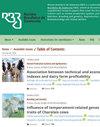用酶联免疫吸附法和高效液相色谱法测定饲料原料和猪日粮中脱氧雪腐烯醇的浓度
IF 1.2
4区 农林科学
Q3 Agricultural and Biological Sciences
Revista Brasileira De Zootecnia-Brazilian Journal of Animal Science
Pub Date : 2023-05-12
DOI:10.37496/rbz5220220155
引用次数: 2
摘要
-目的是比较用酶联免疫吸附法(ELISA)和高效液相色谱法(HPLC)测量的饲料原料和商品猪日粮中的脱氧雪腐菌醇(DON)浓度。70种饲料成分样品包括玉米、玉米干酒糟和可溶物、玉米谷蛋白饲料、玉米谷蛋白粉、棕榈仁挤出剂、米糠、大豆壳、豆粕和小麦。商品猪日粮样本(n = 92)来自韩国不同地区和不同生长期猪的23个猪场。所有样品的DON浓度一式两份测定。对分析方法(ELISA和HPLC)、饮食阶段和地区进行统计学比较。酶联免疫吸附法(ELISA)测定的大部分原料和所有饲料中DON的浓度均高于HPLC法。除玉米干酒糟和玉米面筋饲料外,ELISA法测定的DON浓度均小于1 mg/kg, HPLC法测定的DON浓度均小于0.5 mg/kg。全饲粮中DON浓度不随地区或猪的生长阶段而变化。ELISA法测定的大多数饲料原料和商品猪饲粮中DON浓度均高于HPLC法测定的DON浓度,但韩国各地区和猪生长阶段DON浓度差异不大。本文章由计算机程序翻译,如有差异,请以英文原文为准。
Deoxynivalenol concentrations in feed ingredients and swine diets measured by enzyme-linked immunosorbent assay and high-performance liquid chromatography
- The objective was to compare deoxynivalenol (DON) concentrations in feed ingredients and commercial swine diets measured by enzyme-linked immunosorbent assay (ELISA) and high-performance liquid chromatography (HPLC). Seventy feed ingredient samples consisted of corn, corn dried distillers grains with solubles, corn gluten feed, corn gluten meal, palm kernel expellers, rice bran, soy hulls, soybean meal, and wheat. Commercial swine diet samples (n = 92) were collected from 23 swine farms of varying regions in Korea and different growth stages of pigs. The DON concentration of all samples was determined in duplicate. Statistical comparisons were performed to compare the analytical methods (ELISA vs. HPLC), diet phases, and regions. The DON concentrations in most ingredients and all diets determined by ELISA method were greater than those determined by HPLC. The DON concentrations determined by the ELISA method were less than 1 mg/kg in all ingredients except corn dried distillers grains with solubles and corn gluten feed, and those determined by the HPLC were less than 0.5 mg/kg in all ingredients. The DON concentrations in complete diets did not vary by region or growth stages of pigs. The DON concentrations in most feed ingredients and commercial swine diets determined by ELISA method are greater than those determined by HPLC, but does not vary by regions in Republic of Korea or pig growth stages.
求助全文
通过发布文献求助,成功后即可免费获取论文全文。
去求助
来源期刊
CiteScore
1.90
自引率
0.00%
发文量
25
审稿时长
8 weeks
期刊介绍:
The Revista Brasileira de Zootecnia (RBZ; Brazilian Journal of Animal Science) encompasses all fields of Animal Science Research. The RBZ publishes original scientific articles in the areas of Aquaculture, Biometeorology and Animal Welfare, Forage Crops and Grasslands, Animal and Forage Plants Breeding and Genetics, Animal Reproduction, Ruminant and Non-Ruminant Nutrition, and Animal Production Systems and Agribusiness.

 求助内容:
求助内容: 应助结果提醒方式:
应助结果提醒方式:


